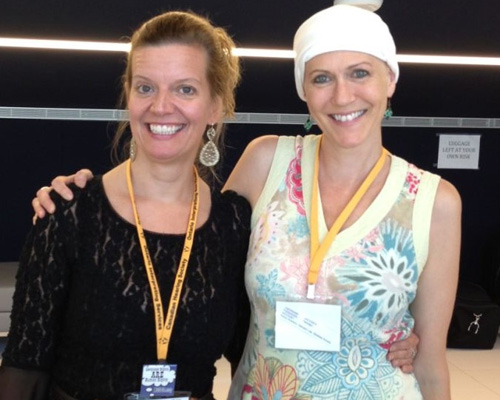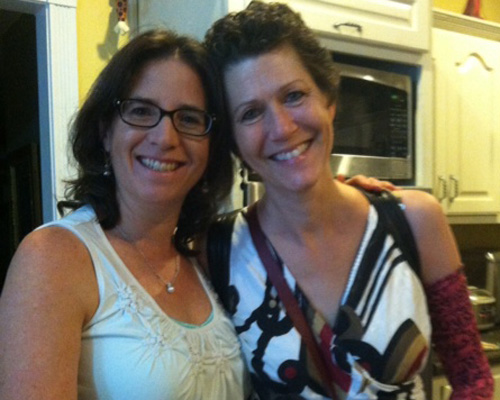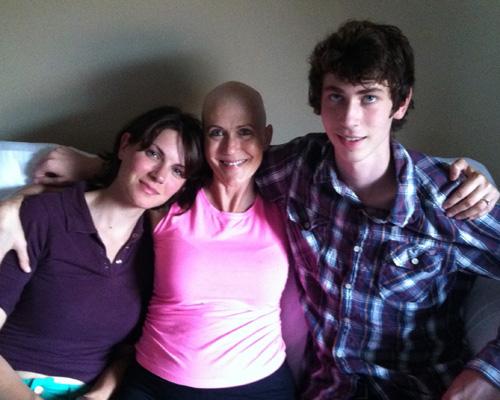It All Started at The Drake Hotel is a five-part series chronicling one woman's cancer experience. Elizabeth gives us an uncut, uncensored version of her breast cancer story – and how food, family, friends and a little bit of Prosecco can go a long way.

Elizabeth stands with Jane Langes, in June 2013. (Photo: Elizabeth)
When a benign tumour was found on my spinal cord, I was told it was 'critical' -- if I started to feel side effects, my chemotherapy would be interrupted.
Did you miss part two?
Click here to read.
Once symptoms of spinal cord compression started, they progressed rapidly. Each day or two, another part of one of my limbs went numb. My right foot, my left forearm, my right lower leg.
I could feel pressure in these areas, but I felt as though I had a layer of latex over my skin, as though I were wearing a pair of rubber gloves, or a wet suit. Climbing a flight of stairs, something I normally do effortlessly, was actually difficult. My legs had become heavy. I was breathless.
I told my son, Solomon. I cannot imagine his and Emily's anxiety, since the day of my cancer diagnosis. And now this.
I was terrified.
The loss of sensation in my limbs coincided with the loss of my hair. It came out in handfuls and rained on my shoulders.
Steve Roy, my dear friend and celebrity stylist, told me it would be less traumatic to get my hair cut short first, before shaving my head. He was right. He did the deed at his home, with Emily filming.
My hair continued to rain. A few days after the pixie cut, it was time to take it all off.
Getting shaved was the most devastating moment of all. Worse than the surgery or the chemotherapy. I cried like a baby. No photo or video this time.
Through the rest of the year, I was ashamed of my baldness. A further insult, my lashes and brows started disappearing. I looked like a human thumb.
I just couldn't get used to the woman in the mirror. She looked like a cancer patient. I hated her.
Without hair, I felt so exposed. Every time I left the house—always with a beanie on my head—I felt as though my blouse was wide open, and I wasn't wearing a bra.
I wore beanies when I finally mustered the courage to leave the house. A wig seemed so unauthentic, and besides, it was summer. I would have melted wearing a wig.
I continued to exercise five or six days a week. My daughter, Emily, and I were gym buddies. We did cardiovascular work, then abs, gluts, and arms. Emily had a habit of increasing the number of reps on a weekly basis. "If it doesn't hurt, we're not working hard enough," she said. I couldn't argue.
Occasionally, I jogged. June 16th was the last run. By the time I got home, my legs were like noodles. Even taking small steps, I could feel a lack of control as each foot landed. I just wasn't connecting with the ground, and I was afraid of falling.
My phenomenal family doctor, Debbie Honickman at Queen West Community Health Centre , who was kept informed of my changing condition, urged me to go to Emergency.
On June 24, I went to the Emergency department at Toronto Western Hospital and explained my symptoms. I stayed overnight, mostly awake, waiting for an MRI that took place around 4 a.m. on June 25, my birthday.
Later that morning, I received an electronic birthday present: a slide show from my best friend, Jane Langes, and her daughter, Julia, with an invitation to visit them in Winnipeg, airfare and all.
The sentiment, and the generosity, moved me to tears. However, from the stretcher in Emergency, with my numb limbs, I truly questioned whether I would be physically able to make it to Manitoba in the near future.
The next morning, I got a pass to leave Emergency to attend an appointment with Dr. Eitan Amir, my medical oncologist, at Princess Margaret Cancer Centre. By the time the appointment was over at 2 p.m., I was exhausted. I'd been in the hospital 21 hours.
I called the Emergency Department, told them I was too tired to return, and asked for the neurosurgery fellow to call me. Since I had a clinic appointment booked with the fellow on the following day, I figured whatever he had to tell me could wait.
Bar Italia birthday surprise
Before the Emergency visit, the plan was to celebrate my birthday with our dear friends, Jim and Harold, who are like uncles to my children. All day I was up in the air about whether to cancel dinner. I hadn't slept! But Emily convinced me it would feel good to get dressed up and celebrate in style. I deserved it, she said, after all I'd been through in the last 24 hours.
I was indeed surprised by a large group of my closest friends in the private room upstairs at Bar Italia – surprised and beside myself with a buzz of warmth and love. My staff from UHN gave me an exquisite gift: custom-made earrings with real emeralds and other gemstones that represented me and my children. After the reception, a smaller group dined together downstairs. The event helped to push the Emergency visit back into the past.
When I met with the neurosurgery fellow in clinic on the following day, he handed me a consent to treatment form.
I was to have surgery in two weeks. The procedure would take 4-5 hours. Not removing the tumour would eventually result in paralysis from the neck down, and death. The risks of the procedure, ironically, were exactly the same.
I told my parents. They called my siblings.
Getting my affairs in order
I immediately called my attorney to update my will. I gathered all of my financial and life insurance information. My daughter, now my next of kin and substitute decision maker, was added to my safety deposit box account.
I needed my family. I asked my sister-in-law, Patty, another health professional, to come the week before the surgery, and she agreed. Fortunately, she was able to get a week off work with short notice. Coincidentally, both my brother and father had been planning to visit right after the surgery, so we were well supported.
Patty was remarkable. She took over as a friend/sister/project manager and mother. She counselled all of us and got the house cleaned up and in order. During the week, she prepared meals too large for us on purpose, so that the leftovers would be in the freezer when I returned from the hospital. I was able to talk to her as I couldn't talk to my kids or my parents. I don't know what I would have done without her.
News of the spinal cord tumour and the upcoming neurosurgery spread across our community of friends, and a flood of calls and emails reassured us that we were not going to experience this alone. Our friends wanted to help in any way they could. Of course, many offered the gift of food.
My dear friend, Harriet Eisenkraft, who was also president of our beyond-liberal Jewish congregation, Shir Libeynu, volunteered to coordinate food scheduling and delivery.

Patty Abraham (left), Elizabeth’s sister-in-law took over as friend/sister/project manager and mother to help Elizabeth (right) prepare for her upcoming neurosurgery. (Photo: Corinne Abraham)
On surgery eve, I had the difficult discussion with my children. If the surgery was not successful, I did not want heroic measures to be taken. No life support equipment. But my children have known this for years.
Emily said it best: "We know, Mom. If you're not you, you don't want to live."
It's a lot to consider for a 23- and 16-year-old.
Solomon was quiet. I wished I just had breast cancer. The spinal cord tumour made breast cancer seem small.
I made several copies of a list of people who needed a call as soon as I was out of surgery. Emily and Patty promised they would take care of it.

Emily (left), Elizabeth (middle), Solomon (right) on spinal cord surgery eve. (Photo: Patty Abraham)
Surgery day
On surgery day, Patty, Emily, Solomon and I walked from our house in Little Italy to Toronto Western Hospital. Patty gave my children and me the opportunity to be alone together in the pre-op holding area.
Shortly after, I was wheeled into the operating room.
Emily's father, Stephen Parkinson, also a close friend, joined my entourage in the waiting room.
Emily told me that after five hours had passed, and no one had come out to update them, everyone started getting anxious.
She was pacing the waiting room like a caged zoo animal when, six and a half hours after I was taken in, Dr. Michael Fehlings appeared. Emily didn't recognize him in scrubs, but when he smiled at her and nodded, she burst into tears.
Michael told everyone to get some dinner. I would be in recovery for quite a while.
I distinctly remember waking up in ICU, feeling groggy as I opened my eyes. As consciousness returned and I realized where I was, I immediately wiggled my fingers and toes. Success!
Stay tuned for
It All Started at The Drake Hotel: Part 4.
Elizabeth rings the brass bell at the Princess Margaret Cancer Centre to signal the end of chemotherapy – an emotionally charged moment.
*Special thanks to Elizabeth for sharing her story with such wit, elegance and candour.
